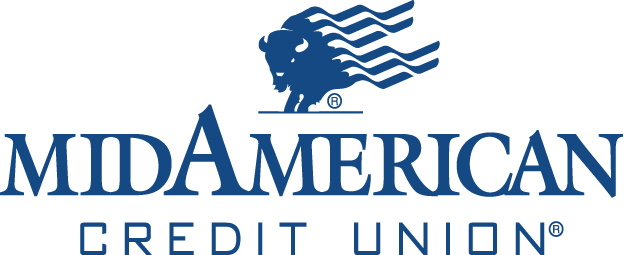
 The Credit Union Difference
The Credit Union Difference
There’s one major distinction between credit unions and banks. It’s you.
As a not-for-profit, credit unions are owned by members. As for-profit institutions, banks are owned by an exclusive group of shareholders.
That one major distinction translates into several differences that benefit all members of a credit union and not just a few shareholders who expect to earn profits from a bank. The credit union difference means that profits are returned to members in the form of lower fees, lower loan rates and higher interest rates on deposits.
With a combined focus on serving members and keeping member costs affordable, credit unions are also willing to work together. Since Mid American is part of the CO-OP Shared Branch Network, you can make deposits and withdrawals and do other select business, like make a loan payment, at the more than 5,600 participating shared branches of credit unions across the U.S. Mid American is also part of the CO-OP ATM Network, giving you access to nearly 30,000 surcharge-free ATMs nationwide.
To ensure we serve our members’ interests, decisions on our finances, products and services are guided by a board of directors, many of whom have been longtime members of Mid American, who volunteer their time and talents to look out for you.
One board initiative, for example, is providing financial literacy through seminars offers to the employees of our business partners and our participation in youth literacy curricula, such as the Reality U financial simulations in area schools, summer camps for economically disadvantaged youth and League 42 youth development initiatives.
Both MACU members and nonmembers who work for our business partners can take advantage of our financial seminars, which are offered onsite at workplaces and cover topics like debt management, surviving inflation, budgeting and carbuying tips.
We also make sure your money is safe with us. Deposits up to $250,000 in credit unions are insured through the NCUA, making us just as safe as banks. History has shown credit unions are even safer. You rarely hear of credit unions failing. That’s because we’re less likely to take risks with our members’ money and we also have higher capital to keep financial losses to a minimum.
Protect Yourself From Online Scams
Online scammers lurk among various areas of the internet, targeting victims in different ways. It is common for scammers to portray themselves as a trusted source. They may pose as a potential love interest, friend, distant family member or as a company you have a relationship with in an attempt to access important and personal information. A good rule of thumb to follow is if you have never met them in person, do not send them any sensitive information or money.
Things to look out for
Here are just a few things to look out for.
Unexpected calls, messages or computer pop-ups asking you to click on a link or respond. If you think it could be legitimate, contact the company or agency but look up their number or website yourself. Don’t use the phone number or web address the caller or message gave you.
A sense of urgency to take immediate action. Scammers want to rush you, so stop and check it out. A request for cash through an unexpected call or message.
Instructions to use a Bitcoin ATM, buy gift cards or move money under the guise of fixing a problem or cashing in on a large amount of money or grand vacation. Real businesses and government agencies will never do that.
Trending Scams
Two trending scams that have affected MACU members are romance and Bitcoin scams.
It is not uncommon for online criminals to create fake profiles on dating apps to lure vulnerable individuals, like someone recently widowed or divorced, with the prospect of companionship or a relationship. Scammers will work to gain your trust and then inevitably ask you for money. They might even promise they’ll use the funds to meet you or arrange a trip together.
According to the Federal Trade Commission, scam losses involving Bitcoin ATMs often happen as a result of government or business impersonations or tech support scams.
“The lies told by scammers vary, but they all create some urgent justification for consumers to take cash out of their bank accounts and put it into a Bitcoin ATM,” the FTC said. “As soon as consumers scan a QR code provided by scammers at the machine, their cash is deposited straight into the scammers’ crypto account.”
Visit https://consumer.ftc.gov/ for more information on spotting and reporting scams.
Upcoming Events & Holiday Closings
Tech Time
Free walk-in tech support on using MACU digital banking tools will be available from 9 a.m. to 5 p.m. on the following Wednesdays:
- Oct. 23 | Northeast Wichita
- Jan. 22 | Main west Wichita
- April 23 | East Wichita
- July 23 | South Wichita
Holiday Closings
- Columbus Day | Monday, Oct. 14
- Veterans Day | Monday, Nov. 11
- Thanksgiving | Thursday, Nov. 28
- Christmas Eve early closing | noon Tuesday, Dec. 24
- Christmas | Wednesday, Dec. 25
- New Year’s | Wednesday, Jan. 1

Factors That can Impact the Home-Buying Process
Buying a home can be an exciting process but keep in mind these five factors to make it a smooth, productive one as well.
Ensure your credit is in good shape. One of the first things a lender will do is check your credit history and score so you should too. This gives you the opportunity to address any discrepancies or incorrect information in your credit report. You are entitled to a free annual credit report from each of the three credit reporting agencies; to request a report, visit annualcreditreport.com or call (877) 322-8228. With a higher credit score, you can qualify for better interest rates and terms.
Avoid making significant financial changes. Your mortgage loan approval and terms will depend on your income’s stability so try not to make a major job change during the loan process. Lenders also consider your debt-to-income ratio so avoid opening more lines of credit during the process. Your goal is to keep a strong credit history so don’t cancel a line of credit, even if it’s unused, because it can lead to a lowering of your credit score. No DIY skills or funds? No deal. A fixer-upper may come with a lower price tag, but if you don’t have the DIY skills or the funds to hire contractors to make the renovations, it won’t be a good buy.
Don’t max out your mortgage. Just because you qualify for a certain amount for a mortgage loan doesn’t mean you need to get a loan for that max amount. Home ownership comes with additional expenses so avoid a mortgage payment that stretches your monthly budget to the limit.
Research incentive programs. Several cities and states offer assistance with closing costs and down payments for first-time home buyers who meet certain income guidelines. To learn more about the Kansas Housing Resources Corp.’s programs, visit kshousingcorp.org. The U.S. Department of Housing and Urban Development website includes links and information about housing assistance programs in each state; visit hud.gov to find that information.
For your home mortgage needs, please call (316) 722-3921 and ask for either me or LeeAnn Marker in mortgages, or email debbies@midamerican.coop or leeannm@midamerican.coop. To view loan rates or start your mortgage loan application process, visit midamerican.coop/loans/homeloans.

After the Loss of a Loved one, Watch out for Scams
By Jessica Brokaw
Scam artists often prey on those who are most vulnerable, including individuals who have recently lost a loved one and are grieving.
Scammers will look for details from obituaries, funeral homes, hospitals, stolen death certificates and social media websites to obtain personal information about a deceased individual and use it to commit fraud.
A common scam, often referred to as “ghosting,” is when an identity thief uses personal information obtained from an obituary to assume the identity of a deceased individual. That information is then used to access or open financial accounts, take out loans and file fraudulent tax returns to collect refunds.
Typically, a ghosting scam will occur shortly after someone's death — before it has even been reported to banks, credit reporting agencies or government organizations such as the Social Security Administration (SSA) or Internal Revenue Service (IRS).
Another scam involves a thief using information from an obituary to pass themselves off as a friend or associate of the deceased — sometimes referred to as a "bereavement" or "imposter" scam. These individuals will falsely claim a personal or financial relationship with the deceased to scam money from grieving loved ones.
Scam artists will also pose as government officials or debt collectors falsely seeking payment for a deceased individual's unpaid bill.
If you recently experienced the loss of a loved one, consider the following tips to help reduce the risk of scams:
- Report the death to the SSA and IRS as soon as possible.
- Notify banks and other financial institutions that the account holder is deceased.
- Contact your state's department of motor vehicles and ask them to cancel the deceased's driver's license.
- Ask the major credit reporting bureaus (Equifax, Experian, and TransUnion) to put a "deceased alert" on the deceased person's credit reports and monitor them for unusual activity.
- Avoid putting too much personal information in an obituary, such as a birth date, place of birth, address, or mother's maiden name.
- Be wary of individuals who try to coerce or pressure you over alleged debts owed by the deceased.
At Mid American, Jessica Brokaw, CFS Financial Advisor, is available to assist you in creating an investment plan designed to help you retire with confidence. She can be reached at (316) 722-3921, ext. 182 or Jessica.Brokaw@cusonet.com.

*Non-deposit investment products and services are offered through CUSO Financial Services, LP (“CFS”) a registered broker-dealer (Member FINRA/SIPC) and SEC Registered Investment Advisor. Products offered through CFS are not NCUA/NCUSIF or otherwise federally insured, are not guarantees or obligations of the credit union, and may involve investment risk including possible loss of principal. Investment representatives are registered through CFS. The Credit Union has contracted with CFS for investment services. Atria Wealth Solutions, Inc. (“Atria”) is a modern wealth management solutions holding company. Atria is not a registered broker-dealer and/or Registered Investment Advisor and does not provide investment advice. Investment advice is only provided through Atria’s subsidiaries. CUSO Financial Services, LP is a subsidiary of Atria. Prepared by Broadridge Advisor Solutions Copyright 2024


